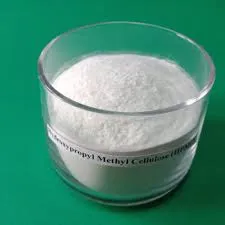
டிசம்பர் . 03, 2024 22:32 Back to list
Understanding the Meaning Behind the Acronym HPMC in Various Contexts
What Does HPMC Stand For?
HPMC, or Hydroxypropyl Methylcellulose, is a versatile and widely used cellulose derivative that finds applications in numerous industries. As a non-ionic, water-soluble polymer, HPMC is valued for its unique properties, which include thickening, emulsifying, and film-forming abilities. But what exactly does HPMC stand for, and why is it significant in various fields? This article delves into the definition, properties, applications, and benefits of HPMC, shedding light on its role in modern science and industry.
Definition and Composition
HPMC is produced from natural cellulose, which is derived from wood or cotton. Through a series of chemical modifications involving hydroxypropyl and methyl groups, HPMC is created, imparting it with unique characteristics that distinguish it from other cellulose ethers. Its molecular structure allows it to dissolve in cold water, and it forms a gel-like consistency when mixed, which makes it highly useful in multiple formulations.
The addition of hydroxypropyl groups enhances its solubility, while methyl groups contribute to its stability and viscosity. These modifications not only result in a product with excellent mechanical properties, but also ensure that it is environmentally friendly, as it is biodegradable and non-toxic.
Properties of HPMC
HPMC boasts several notable properties that contribute to its wide-ranging applications
1. Water Solubility HPMC dissolves easily in water, forming a transparent gel when hydrated. This property is particularly important in pharmaceutical and cosmetic formulations.
2. Thickening Agent It is commonly used as a thickening agent in various products, providing the desired viscosity without altering the product's other characteristics.
3. Emulsifying Agent HPMC helps in stabilizing emulsions, ensuring a consistent mixture of oil and water—which is critical in cosmetic and food formulations.
4. Film Formation It can form films that are useful in creating protective layers in applications such as coatings and adhesives.
5. Controlled Release In pharmaceuticals, HPMC's properties are exploited to create controlled-release formulations, allowing for sustained release of active ingredients over time.
Applications of HPMC
what does hpmc stand for

The varied properties of HPMC lead to its widespread use across multiple industries
. Some key applications include1. Pharmaceuticals HPMC is extensively used in the production of tablets and capsules. Its role in controlling drug release and enhancing the bioavailability of medications is invaluable.
2. Food Industry As a food additive, HPMC serves as a thickener, stabilizer, and emulsifier. It enhances the texture of sauces, dressings, and ice creams while maintaining moisture.
3. Cosmetics and Personal Care In skin creams and gels, HPMC acts as a thickening and stabilizing agent. Its film-forming properties help in creating smooth applications and prolonging the product's effectiveness.
4. Construction HPMC is used in the production of mortars and plasters, improving their workability and adhesion properties.
5. Agriculture It can be found in agrochemical formulations, where it serves as a binder for herbicides and pesticides, enhancing their effectiveness and stability.
Benefits of HPMC
Choosing HPMC for various applications comes with significant benefits
- Safety HPMC is generally recognized as safe (GRAS) by food and drug regulatory authorities, making it suitable for direct consumption in food products and medicines.
- Versatility Its wide range of functionalities allows it to be used in diverse formulations, simplifying the development of multi-functional products.
- Eco-Friendliness Being derived from natural cellulose, HPMC is biodegradable and poses minimal environmental risks.
- Stability HPMC maintains its properties over a wide range of pH levels and temperatures, ensuring consistent performance across different conditions.
In conclusion, HPMC represents a key compound in various sectors, standing out for its versatility and functionality. With its exceptional properties and applications, HPMC plays an essential role in advancing technology and improving product quality across multiple industries. Whether in pharmaceuticals, food processing, cosmetic manufacturing, or construction, the significance of HPMC cannot be overstated, making it a vital ingredient for innovation in contemporary formulations.
-
Versatile Hpmc Uses in Different Industries
NewsJun.19,2025
-
Redispersible Powder's Role in Enhancing Durability of Construction Products
NewsJun.19,2025
-
Hydroxyethyl Cellulose Applications Driving Green Industrial Processes
NewsJun.19,2025
-
Exploring Different Redispersible Polymer Powder
NewsJun.19,2025
-
Choosing the Right Mortar Bonding Agent
NewsJun.19,2025
-
Applications and Significance of China Hpmc in Modern Industries
NewsJun.19,2025







